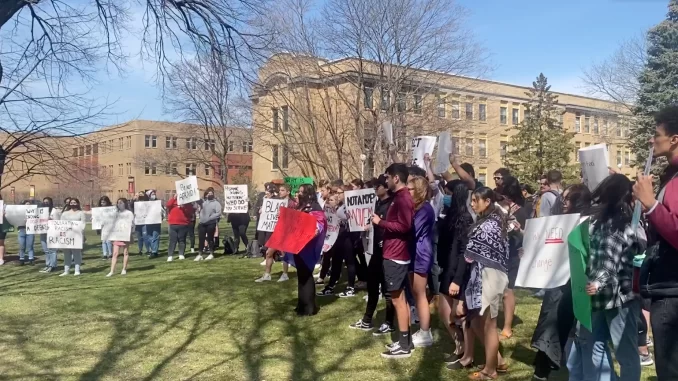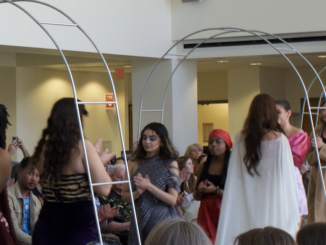
Litzi Duran
Contributing Writer
On April 15th, student protests erupted at Concordia University Chicago (CUC) after CUC administration banned a professor who stood up for students experiencing racism on campus
Paul Stapleton, an English professor at Concordia University, and his wife, Karen Cruz, held a meeting with administrators to bring attention to a racism incident committed by another faculty member on campus according to a change.org petition.
In a social media post on Facebook, it explains Stapleton reported to CUC administration made a racist statement during class that Black people should be grateful for slavery.
After this meeting was held, the administration did not act against the unnamed professor, it acted against Stapleton instead. He was suddenly banned from campus grounds after he brought awareness about this incident. Stapleton was not given a reason why he was banned; he was only told that he could only teach his classes via Zoom, according to the Wednesday Journal.
On April 12, students at CUC took to the streets to protest against administration for the ban against Stapleton. During this protest, students were expressing that the campus culture of CUC consist of racism and homophobia.
CUC President–Russell Dawn–organized a town hall meeting following the protests. During the meeting, students shared their frustrations with administration of not being heard due to their failure to act on past reports and incidents of racism through an online student portal.
For the university to improve its response to racist incidents on campus, Dawn has recently proposed a series of diversity and inclusion efforts. These efforts include administration leaders meeting with student organizations to develop a future action plan to address racist incidents, along with roundtable talks between students and administration.
As of right now, Chad Rohman, Dominican’s dean of Rosary College, stated that there is no change in reciprocity between Dominican and Concordia.
Is Dominican different compared to CUC?
According to faculty and students, Dominican is guilty of having its own faults. Recent issues include the controversial social media post by Dean of Students, Norah Collins Pienta, of a Blue Lives Matter Flag on their Facebook page, and the university’s lack of diversity among faculty and staff.
Amy Omi, Truth and Racial Healing coordinator and university minister at Dominican, does not condone the actions of Concordia.
“I think it is unconscionable to ban a professor that is acting on good conscience and values of equity and wanting to support students of color,” Omi said. “[They] are traditionally marginalized students who are seeking a safe space in an educational environment. They deserve to be educated in a way that does not cause them harm.”
Omi goes on to explain that this action by Concordia administration is a defensive one, as it attempts to sweep things under the rug and put blame on those who are innocent. However, she knows Dominican is not perfect either. Even though Concordia’s racism is seen to be more overt, these behaviors at Dominican are more hidden.
“It operates in insidious ways that aren’t as easily recognizable,” said Omi. “Part of that is because we have people in positions of power that know how to talk the talk of antiracism [but] are only talking that talk because it upholds their position of power because its trending.”
Lisa Petrov, the Title V Project Director, emphasizes that Dominican has done a good job at bringing awareness about race and is willing to talk about them but there is still work that needs to be done.
Petrov and Omi came together to create white accountability circles for faculty and staff to participate in.
According to Omi, the goal of these initiatives is to study how white supremacy functions, how it impacts the socialization of white people, and how the current racial constructs offer white people privileges and resources that BIPOC persons are denied.
Petrov and Omi both admit that change has been slow at Dominican. The reason for this is due to faculty and staff needing to be willing to participate in these efforts because all the work is voluntary. Petrov estimates that there have only been 10 faculty and staff members who have participated in these circles.
“You can offer sessions and offer opportunities to learn and experiences but in the end it’s the faculty and the staff and even the students who opt in and decide to do that work as opposed to it being something that everyone has to do,” said Petrov.
Looking towards the future of DU:
Kymbrea Valrey, madam president of the National Association of Colored Women’s Club at DU, hopes that one day the faculty and staff at Dominican becomes truly diverse. She believes that diversity is key to increase the Black student population at DU because right now, that feeling of belonging is lacking.
“The biggest role in why Black/African American students do not feel connected or welcomed is because they don’t see enough of their people to feel comfortable,” said Valrey. “It’s possible to have more minority students be involved if they saw the same people in the institution like them.”
Although change takes a long time to happen, both Omi and Petrov are happy to have people in positions of power who are willing to participate in DEI work. They say they both look forward to how President Glena Temple will make an impact at Dominican, as she has shown that she holds these values to heart
“I feel more hopeful than I ever did and that’s because the new president really cares about this work and is willing to be disliked for it. At the very top, we have excellent leadership for DEI work,” Petrov said.
There are also no updates on the CUC racism incident at this time.
lduran1@my.dom.edu



